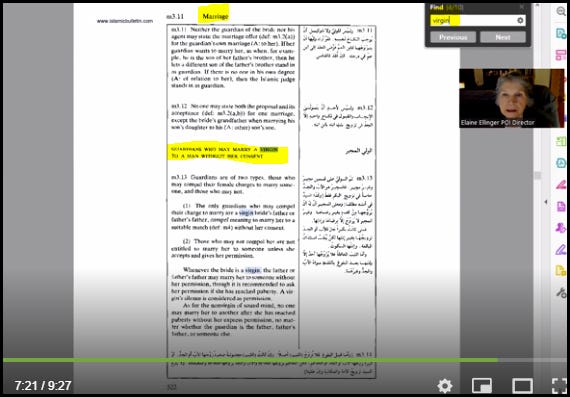How to do your own research
Islamic doctrine – what does it really say?
People are often confused by what they read or hear about Islamic doctrine and don’t know what to believe. There is a solution. Learn how to research Islamic texts for yourself and not rely on others for information. Authentic foundational doctrine is best.
The resources used by Islamic scholars include both the Koran and the Sunnah of Mohammed (his life and traditions). The example of Mohammed is extremely important, without it, even the five pillars of Islam cannot be properly practiced.
Mohammed can be found in the Hadith collections (stories and traditions about Mohammed) and the Sira (Mohammed’s biography). Together the Koran and Sunna provide the guidance for sharia – Islamic law, what to do and how to do it.

There are several Koran and Hadith search engines. The two examples below were chosen because the first includes several translations of the Koran, with the Arabic, and easily provides as much context as the reader wants.
The second search engine includes many Hadith but the ‘six authentic’ collections studied by many Islamic scholars are: Bukhari, Muslim, Dawud, Tirmidhi, al-Nasa’i, ibn Mahaj. Hadith quality is graded, the best are ‘sahih’.
There are also links to two websites that are repositories of such data. These resources have already compiled many Koranic verses and hadith under listed topics such as: women, jihad, non-Muslim (Kafir) etc.
I recommend downloading the Sira ‘Life of Mohammed’, and the sharia manual ‘Reliance of the Traveller’, to a file on your computer and bookmarking the search engine websites for the Koran and Hadith in the bookmarks bar of your browser.
There is a video below demonstrating how to use these tools.
Data sources:
Koran: https://legacy.quran.com/
Hadith (stories and traditions about Mohammed): https://sunnah.com/
(Sira) Guillaume, Alfred. 'The Life of Muhammad: a Translation of ibn Ishaq’s Sirat Rasul Allah' Oxford University Press, 1967 https://archive.org/details/GuillaumeATheLifeOfMuhammad/page/n3/mode/2up
*The first, and arguably the best, biography of Mohammed. 8thc.(Sharia manual)Reliance of the Traveller Nuh Ha Mim Keller, Amana Publications 2015 (ROT) https://archive.org/details/relianceofthetravellertheclassicmanualofislamicsacredlaw
* Sharia is the ordained way of the Koran and Sunna of Mohammed. It is all sharia. The manual is only for convenience, to look up specific situations.
Data repositories:
Perspectives on Islam: Provides links to all the above on the home page and a ‘resource’ page listing books, papers and videos examining the many facets of Islam from the perspective of the non-Muslim: https://www.poi-nps.com/
CSPII see ‘research’ in right sidebar: https://www.cspii.org/learn-political-islam/methodology/
Religion of Peace Koran subject index: https://thereligionofpeace.com/pages/quran/index.aspx
Notes:
It is sometimes said that a Koran verse or hadith has been ‘misinterpreted’, and yes, the terminology does take some getting used to – for example – a sex slave will be referred to in the doctrine as ‘what your right hand possesses’. However, this argument is 14 centuries old – most people were illiterate, and there were no books. If Mohammed’s followers had questions, they were told to ask those who had memorized parts of the Koran or Hadith: ‘Ask those who recall if you know not’ (Koran 16:43)
Also, Islamic foundational doctrine was specifically forbidden to the non-Muslim until recently (ROT 8.3), but now, when 80% of the world’s Muslims do not speak Arabic, it is necessarily translated for sale in many languages. The doctrine is available, and if you are reading this, you don’t need someone else to tell you what it says.
What is important, is that translations be consistent with the authentic history of the life of Mohammed – for example the Sira by Ibn Ishaq and the Hadith – rather than a softened version that is not accurate. Good translations of the Koran include Khan, Pickthall, Spencer, Yusef Ali, Sahih International.
Be aware that there are many examples where even schoolbooks and museums print and display inaccurate information – it is best to do the research for yourself so you won’t be led astray.
Demonstration video: Easy steps to researching Islamic doctrine


